Featured Students: Dentistry
Gurpreet Singh
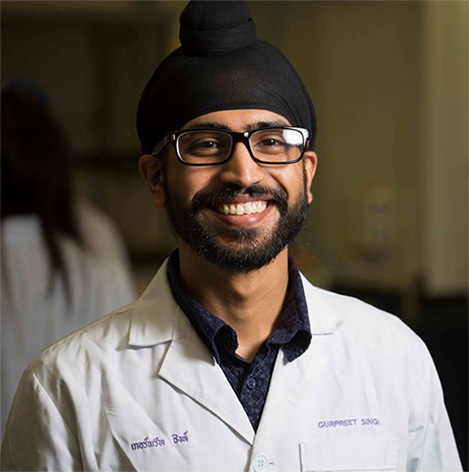 My name is Gurpreet Singh and I graduated from CSUF the summer of 2014 with my Biochemsitry degree. Currently I am working as a research assistant at Stanford University, an opportunity made possible through the CSUF CIRM Bridges program. I am ecstatic to be starting dental school at UCLA this coming September and planning to apply for PhD for a dual degree program.
My name is Gurpreet Singh and I graduated from CSUF the summer of 2014 with my Biochemsitry degree. Currently I am working as a research assistant at Stanford University, an opportunity made possible through the CSUF CIRM Bridges program. I am ecstatic to be starting dental school at UCLA this coming September and planning to apply for PhD for a dual degree program.
During my time here I was very involved with Student Health Professions Association, holding positions from Volunteer Coordinator to being President. I also worked in research, completing my Honors research thesis with Dr. Srinivasan and Dr. Nikolaidis. Overall, my experience at CSUF was excellent and having completed my undergraduate education at CSUF, I would not choose to attend any other institution. The faculty and staff are fantastic at their jobs and do everything possible to provide support for students.
Application process/interviews
Going through the application process is long and strenuous so it is an excellent idea to get started early. I cannot emphasize the importance of this point enough, applying early is vital to maximizing your chances of interviews to get your foot in the door. Apply to a wide range of schools meaning at least 10 schools, but make sure to look up the school so you understand the mission of the school as well as the strengths and weakness of each school. Aside from applying early, use the Intent to Apply to get started on your application early as several questions on the AADSAS are similar or require the same information in some part. Finally, make sure you are on Studentdoctor.net as it is a great source to finding study strategies and other resources.
Having a wide array of extracurricular activities is nice but your numbers are what will get you in the door, so don’t use time that you would spending studying for class or for the DAT to go volunteer. However, this does NOT mean that you can ignore doing extracurricular activities, they are vital to having a successful interview. At some point, everyone tends to have the same numbers and it is at that point where your extracurricular activities differentiate you from your peers. I’m sure you have heard it before many times but be honest, the interviewers will know immediately if you are trying to lie. As a final piece of advice, work on your people skills. These are the skills that are going to help you interact with your interviewers and make a connection with them so that they remember who you are as a person instead of just another applicant. It is also these skills that are going to be utilized the most in your practice, dentistry is a people profession and there is a whole range of people that you will be interacting with in the future.
It may seem like a tremendous amount of work, but rest assured it will be worth it to pursue your dream and passion. Having to pass up on an event to study may seem like a sacrifice but it will be worth it when you get that interview call.
Best of luck and stay persistent!
Ramez younis
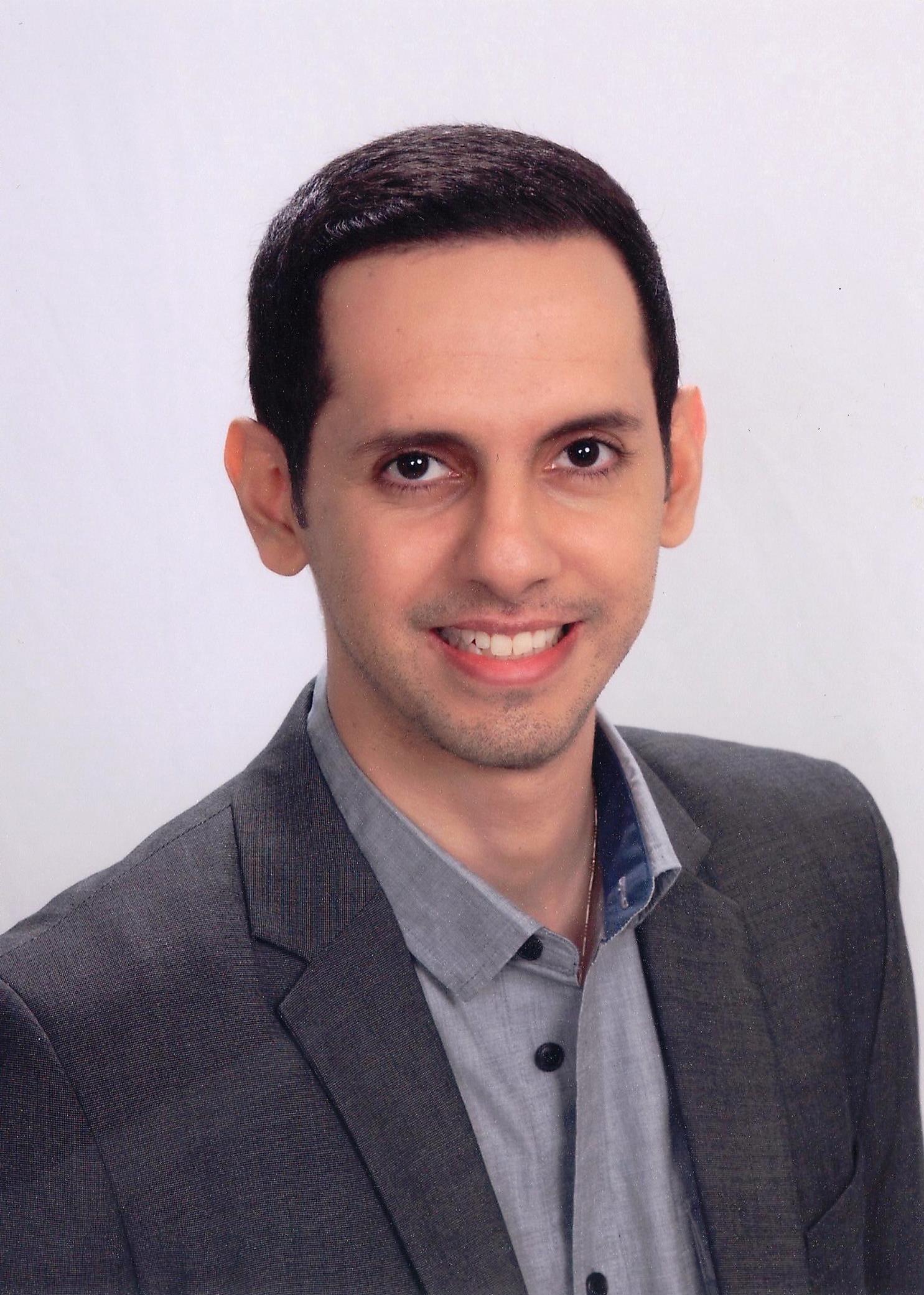
I always knew I wanted a career in healthcare. After shadowing doctors and nurses, I realized that I wanted to engage in more technical work that would bring immediate relief to patients. In exploring dentistry, I discovered that the nature of the profession would give me the fulfillment that I found lacking in my previous experiences. Dentistry also seemed to align better with my personality and ability to work with my hands.
Earlier this year, I began attending Temple University - The Kornberg School of Dentistry in Philadelphia, Pennsylvania. As a nontraditional student, I wanted to share some advice with you…
1. Keep improving your study habits. Be confident in your abilities and work through any weaknesses.
2. If you must work, then take your time to graduate. Make sure that you have a comfortable school load with no breaks and do not let your grades suffer. If you are working, then you can always justify that on your application. It is much more difficult to justify an extensive pattern of low grades.
3. Attend office hours and build professional relationships with your instructors. Send them a thank you email at the end of the semester and let them know what you enjoyed and highlight what you learned. This will make the process of requesting a letter of recommendation later a lot smoother and you will receive a stronger, genuine letter.
4. Utilize all the resources at CSUF! Dr. Christina Goode at the Health Professions Advising Office will give you the best honest advice. The tutoring center, writing center and career center can look at your personal statement and help you develop it. The career center also offers mock interview opportunities. Join the CSUF Pre-Dental Society to meet like-minded individuals.
5. Apply early! Once you have your personal statement completed, you have no excuse not to submit your application and transcripts in early June.
6. The DAT- I studied 1 or 2 hours per day for a few months and did well. Saving your own class notes and textbooks will eliminate the need to invest in an expensive DAT course. Practice tests are a must!
7. Apply to schools that have resources that APPEAL to YOU. Temple University appealed to me because of its strong clinical program, as well as the simple fact that lectures are video recorded for future reference. Furthermore, the professors I met during my interview were very approachable, personable and friendly. Be mindful of the location and weather as well. The ADEA Official Guide to Dental Schools is a must-have resource.
8. Volunteering- There are a lot of opportunities in Orange County and you do not need to travel far. Ask for more responsibilities in the organization and try to learn as much as possible from the dentists and staff. Some organizations will even train you to become a dental assistant, as well as write a letter of recommendation to support your application. Keep in mind that many applicants have been extensively exposed to dentistry because one or two of their parents are dentists, or were employed at a dental office.
9. Research- If interested, this provides an early opportunity for you to realize if bench research is something you are passionate about and want to pursue in the future.
10. The Interviews- You will meet a wide array of personalities, some applicants have elaborate resumes and several degrees, but have applied twice or three times and have not been offered any acceptances. After graduating from CSUF, I did not enroll in a post-back or master’s program. Simply dress to impress, and be the most professional version of yourself. Do not shy away from asking questions. Interact with the staff and the students to learn as much as you can about the curriculum, the city, housing and transportation options, etc.
If you have any questions, please do not hesitate to email me at rayounis@hotmail.com.
Good luck!
David Cho
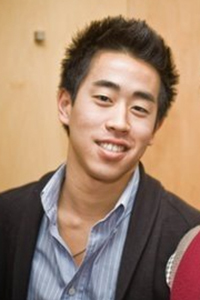 About me
About me
I received my Bachelor’s Degree in Biology in June of 2007 from Northwestern University and after being rejected from all the dental schools that I applied to immediately after graduation, I took some time to evaluate and plan the steps I needed to take in order to remedy my less-than-stellar undergraduate career. 2 years at CSUF, an expired DAT score, lots of time in the library, and hours of invaluable help from numerous CSUF faculty later, I’ve finally achieved my goal of gaining acceptance into dental school.
Advice to Re-Applicants
With the number of dental school applicants increasing every year, there will inevitably be an unfortunate number of individuals that will experience the same humbling experience that I experienced in the summer of 2007 - receiving rejection letter after rejection letter from dental schools informing you of your inadequacies and shortcomings. From this experience, I’ve come to realize that failures such as these can serve as an invaluable learning experience that, I believe, can set you up for future success.
If you are currently in a similar situation to the one I was in three years ago, the first thing I would suggest that you do is to make sure that you have had ample experience in the field of dentistry (ie. shadowing, front- and back-office work, dental related research, etc) to know that it is a profession that you are willing to make sacrifices to be a part of. As much as I want to expound on the fact that poor applications can be remedied by good planning and hard work, it is also important to note that it is imperative that you are pursuing dentistry for the right reasons. Going down a difficult path to work towards a goal is made infinitely more difficult if the goal is not in-line with your passions and interests. Long story short, do your best to get as much information as possible about the dental profession and what it entails. I’ve found that there is undoubtedly someone in your life, whether it be a family member, friend of the family, or friend, that has a close relationship with their dentist and is willing to introduce you to them. Make sure dentistry is for you!
If after this process of discovery you remain passionate about dentistry and still wish to work towards getting into dental school, it is time for you to make realistic goals about what you are going to do to improve yourself as an applicant, and a student. Below is a condensed version of the many things I had to consider while making my own plan.
1. Where am I going to take classes and through what kind of program? Masters? Formal Post-Bacc? Informal Post-Bacc?
One of my major hurdles in getting into dental school was my 3.0 undergraduate GPA. As such, it made the most sense for me to get into a situation in which I was able to take as many classes as possible. CSUF provided me with the opportunity to take classes full-time while also giving me the chance to take advantage of the Health Professions Advising office. From my own personal experience and research, it seems that while dental schools do appreciate someone completing a masters program, taking classes through both formal and informal post-baccalaureate programs is also a viable option. Simply put, as long as you consistently get exemplary grades for an extended period of time (close to 2 years), you have a chance of getting interviews and acceptances in spite of your previous missteps.
2. What classes should I take?
In short, you should take upper-division BCP (Biology, Chemistry, Physics) classes full-time (4 classes per semester). Remember, dental schools use your GPA to make a judgment call on whether or not they think you will be able to handle the rigors of the dental school curriculum. Because of this, taking a couple classes here and there does not give an admissions committee sufficient evidence that you will be able to handle a full-time course load in dental school. Also, if you were a Biology major in college, you already have a lot of BCP units and taking a couple classes will not have much of an effect on your GPA. Again, this is coming from someone that had a 3.0 GPA in college so if yours is in the mid-3.0s, be sure to adjust accordingly.
3. When to take, or re-take, the DAT?
Whether you are a first-time applicant or a re-applicant, you need to do a little research on the DAT score policy of the schools you are interested in applying to. If there is even a small chance you are applying to school X, find out after how many years school X considers a DAT score “expired”. Schools range from 2-4 years on this (among the schools I applied to) so it was necessary for me to re-take the test. If you are planning on taking classes and getting your GPA up before applying, you do not want to take the DAT until the summer before you apply (at the earliest!) as you will run the risk of only being able to use your score once for the schools that only accept scores received within the past 2 years.
4. Extra-Curricular
The reason why schools look for dental-related ECs is that they want to know that you are truly interested in, and passionate about, dentistry. By shadowing, interning and/or researching, you are giving yourself a chance to learn more about the field, but you are also giving yourself a huge advantage in the application and interview process. Many questions I had during my interviews centered around my extra-curriculars and what I was able to glean from my various experiences. I can’t imagine having to answer the question “how do you know that dentistry is for you?” if I hadn’t had hours upon hours of first-hand experience.
5. Planning, planning and more planning.
While my path to getting into dental school has by no means been easy, it would have been increasingly more difficult had I not taken the time to carefully research and plan my past couple years. With all of the things to consider, many of which are mentioned above, it would be easy to overlook something. As such, it is important to research due dates, how long your professors take to write letters of recommendation, CSUF Health Professions Advising protocol, DAT dates, etc. After you feel like you have a good handle on what and when you need to do things, you need to take the important step of establishing a REASONABLE timeline for yourself. Don’t spread yourself too thin as that will only lead to you not being able to perform at the level that you need to. If you need to take classes full-time and also need to take the DAT, try to figure out a way to take the DAT over the summer so that you are able to completely devote yourself to studying for the DAT and the DAT only. Also, if your GPA is below a 3.0, think long and hard about applying the next cycle. I made the tough decision to skip an application cycle and give myself 2 years to get my GPA up, get my Letters of Rec, study and take the DAT, and to get more dental experience, and I couldn’t be happier about my decision.
6. Take advantage of the resources you have at your disposal!
A lot of individuals spend their undergraduate careers going to class, doing the necessary work, taking the tests and (hopefully) getting good grades. Many students don’t realize, and don’t put to use, the amazing resources CSUF has to offer. While most dental school applicants know they need letters of recommendation, many wait until several semesters have passed to ask a professor. As soon as you identify a class as one that you believe you will excel in, establish a relationship with your professor and ask them for a letter of recommendation ASAP so that they can write a more personalized one that includes more than your grade. Also, make sure you take advantage of the Health Professions Advising Office. They will help you setup your recfile, plan your classes, organize your application, and work on your personal statement. Don’t let knowledge and experience Dr. Goode has go to waste!
Having spent close to 4 years after college in order to get into dental school, it is pretty common to hear family and friends second-guess my decision to keep plugging away. I can honestly say that the many supportive and immensely helpful faculty I met at CSUF played an integral role in my eventually achieving my goal of pursuing a career in dentistry and hope that anyone considering a career in dentistry, or re-applying to dental school, will find a way to take advantage of the resources and opportunities they have before them. Good luck!
Evan Kania
I graduated from CSUF in 2008 with a BA in Biology graduating Summa Cum Laude. I am currently attending Oregon Health and Science University School of Dentistry class of 2012. During my time at CSUF I was involved in SHPA for three years. I was the Program Coordinator and the Inter Club Council Representitive my Junior year and I was the Dental Chair my senior year. I received the Miles D. McCarthy Health Profession Award my senior year prior to my matriculation to OHSU. The HPA Office was very supportive and helpful during my time there and cannot tell you how many compliments I received at interviews about the thoroughness and completeness of my committee letter. I am very grateful for the HPA Committee and CSUF is very lucky to have them.
Farzan Mojgani
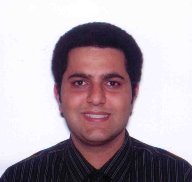 About me
About me
If you are reading this during the month of January and planning to apply next cycle, please ask for Letters of Recommendations right NOW. This will allow the instructors extra time and more memory of you than asking them in May.
Hi, my name is Farzan and I am a transfer student from Orange Coast College, OCC. I am studying Biological Science with a concentration in Cell and this is my last semester before matriculation next fall. I have had the privilege of attending a few interviews and receiving some acceptance offers on December 1st (this is the first day dental students are informed of acceptances in accordance to American Dental Education Association). Before transferring from Orange Coast College (OCC), I was able to visit potential undergraduate campuses, yet none of them came close to how I felt about California State University, Fullerton (CSUF). I chose CSUF over any other universities in California due to several reasons including but not limited to the friendly and caring instructors, staffs, students, overall a very warm and helpful environment. In fact, the help and phenomenal guidance from staff and professors at CSUF certainly helped me gain acceptances to dental schools.
My love for dentistry started when I experienced the most astonishing visit and dental treatment, back in high school. I was diagnosed with a major cavity that required root canals, so I explored both my sense of curiosity and defeated the fear of the procedure by asking the dentist to explain the process to me. He walked me through it, step-by-step, and gave me a feeling of security. At the end, I felt relieved when I saw the dentist's satisfaction with the result. My interaction with the dentist and his work sparked my interest in dentistry and my journey in dentistry began. To explore the field of dentistry, for the past two years I have been involved with assisting three general practitioners, an Orthodontist, and a Periodontist. Being involved in all these offices has assured me that I will enjoy dentistry. I came to understand that dentists have the power to ease patient's worries immediately and I love this about dentistry.
Most of my involvement with pre-health clubs goes back to when I was the Vice president of Doctors of Tomorrow at OCC, and I furthered my interest in dentistry while being involved in the Student Health Professions Association (SHPA). Gratefully, I was able to make connections with fellow Iranians at CSUF through the Iranian Student Association. I also had the honor of being a part of Dr. Alison Miyamoto's Laboratory and worked to identify novel protein interactors for Notch I, a transmembrane receptor, from a human brain cell cDNA library. I also enjoy tutoring my fellow classmates at the Opportunity Center located on the 4rt floor of McCarthy Hall. Besides my excitement towards scholastic activities, I have been involved with introducing and organizing events at my religious center, California Zoroastrian Center.
With that said, it is important to keep in mind that the application process is very expensive, brutal, and stressful. You get to know a lot about yourself, get to travel, and meet some great applicants. I personally think that Grade Point Average (GPA) is much more important than Dental Admission Test (DAT) scores since it takes 4 years to build your GPA versus about 4 months to master the DAT. Don't get me wrong; both GPA and DAT scores are crucial to being noticed and receiving interviews. Even though the breadth and load of classes is important, 12 units of A's stand much higher than 16 units of B's and C's; so pick your classes wisely. Also, receiving an interview does not mean acceptance. It means you are qualified like 400 other applicants, out of 4000, and it's time to shine one last time. This should be taken as a time to show interviewers just how you stand out in comparison to the other 400 qualified applicants. Lastly, as I decide which program I will attend, I realize that the journey never ends. So, it is especially important to remember that this is all a journey and along the way, remember to enjoy life.
Here are some additional tips:
- Apply EARLY (before the end of June).
- Apply to a lot of schools 15+ (after all your hard work, you would rather get in the 1st time).
- Be consistent with your GPA and keep it up.
- Take your science classes seriously as they will help you in the DAT and dental school.
- DO NOT wait until May to start studying for the DAT. Study during the winter break and take it in March so, just in case, you have a chance to re-take it again three months later.
- Get involved with some dental offices. You will LEARN A LOT and this will give you the opportunity to make sure that dentistry is for you.
- Of course, extracurricular activities are VERY important. Do a variety of them.
- Meet Dr. Christine Goode immediately.
- Use and Abuse Studentdoctor.net
- Enjoy the process!
Best Wishes,
Farzan Mojgani
December 2010
CSUF C/O 2011
Jean Pierre Rwigema
About Me
Jean Pierre graduated from the Post Baccalaureate Program in Health Professions in spring 2007 and matriculated to UCLA in Fall. His background was in computer science.
Kevin Tran
Hi everyone! My name is Kevin Tran and I’m a biochemistry major. I will be attending the University Of Minnesota School Of Dentistry this fall 2014! During my time at CSUF, I participated in Sigma Nu Fraternity, an organization that emphasized social and philanthropic activities. In addition, I conducted undergraduate research with Dr.Haan, studying Direct Liquid Alkaline Fuel Cells for three years. Lastly, I spent the rest of my time exploring different health fields. I volunteered and shadowed at various clinics, including pharmacy, optometry, medicine, and dentistry. My exposure to all these different health fields allowed me to make a more informed decision. I believe this is the first thing students should do, if they are considering any health field. As for myself, I chose dentistry because of its ability to integrate small business ownership, health sciences, material chemistry, and the hands on nature of the job.
Application process:
- The AADSAS application process normally opens the first Monday of June. Make sure you immediately download the transcript matching form and have your transcripts sent out to AADSAS. This part takes the longest to complete because your GPA has to be verified.
- When you are filling out the application, make sure to be coherent and most importantly succinct.
- Do not worry if you don’t have enough space, you can elaborate in your secondary application and interviews.
- Applying early is of paramount importance so try to get your entire application completed, DAT scores received, GPA verified, and letter of recommendations (LORS) sent in by August at the latest
- Make sure to apply to a variety of different types of schools, because you will never know what school will accept you. When I was figuring out what type of schools to apply for, I decided to apply to “top”, “mid” and “low” tier schools. The rankings are dependent on your view and what you want out of a dental school, but I made sure to apply very broadly. I recommend at least 16-20 schools.
Interview:
- If you have not already started, begin saving money for your interviews. It is a really expensive part of the application. Expect to spend about 300-500$ per interview. This includes airfare, travel expenses, lodging, and food.
- Dress conservatively. You do not have to have a brand name suit, but make sure the suit fits you properly. Spend the extra money to get it tailored.
- Proper suit attire for interviews is normally navy blue, charcoal, or grey. Despite what some people say, black suits are actually for funerals or night time events.
- Make sure to get plenty of sleep the night before and give yourself an hour to get ready in the morning.
- If you are being interviewed by more than one person, make sure to give everyone present equal amounts of eye contact and make sure to smile!
- Admission members take into consideration not only how you interact during the actual interview, but also with your peers. Assume eyes are on you during your entire time at the school.
- Lastly, make sure to answer the question and do not be afraid to ask for clarification
Closing remarks:
My time at CSUF has been a life changing experience. Without the guidance of Dr.Goode and the rest of the Health Profession Advising Office, I sincerely doubt I would have been as successful. Therefore, any student that is interested in dentistry should immediately contact the office and setup an appointment. To any students that have further questions about the application process, personal statements, etc. feel free to contact me. I can be reached through the Health Profession Advising Office. Good luck to anyone reading this!
Mary-Ann Khamis
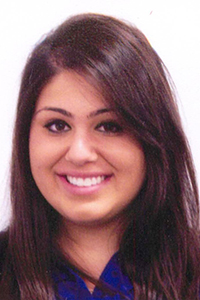 About me
About me
When I first came to CSUF I had no intention of becoming a health professional, more specifically a dentist. Becoming a dentist was the last thing on my mind. I was always afraid of the dentist. As a child I would dread going and make the biggest fit possible to not go. However as I grew older, I realized it is the ability to transform patients physically by improving their oral structure and emotionally by increasing their confidence that attracts me to the world of dentistry. After my own orthodontic treatment, I was intrigued and mesmerized. When I first smiled after my braces had been removed, I was stunned by the significant and immediate enhancement of my self-esteem. It was then that I knew I wanted to pursue a career in dentistry. Dentists most certainly make a difference in the lives of their patients through their artistic and creative ability, which is exactly the satisfaction that I want as a health professional. It amazes me that dentists can use metal and other synthetic elements to restore and remodel mouths, whether by simply fixing a decaying tooth or straightening a smile. I want to actively use my hands in the implementation of treatment used to resolve a diagnosis. Dentistry by its very nature demands this type of health care in which I can use both my mind and my hands to help others in a unique and creative way. Most importantly, I want to provide happy and healthy smiles to society throughout the rest of my life.
The road to applying to dental school is rough and was not the easiest for me. I had a really good GPA but not as great as a test score as I was hoping for. I did what I could and just tried my luck and applied. Initially, I was weight listed at USC in April and didn't hear until middle of May. I was upset for a very long time, but I kept pushing myself to work harder, but I knew that I was capable of doing it! I knew that hard work would eventually pay off, and luckily it i did :)
Advice
- Apply Early!
- Take the DAT seriously, it makes a huge difference in the application pool!
- Try your best to keep your GPA high. Having a high GPA not only shows hard work and dedication, but consistency.
- Extracurricular work is important, especially volunteer work in a dental office.
- Relax and enjoy every step of the way, because no matter what it will all work out in the end :)
Phil Acevedo
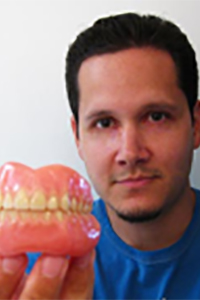 About me
About me
To say that I wasn't the typical Health Professions student would be an understatement. I entered CSUF as a biology major, torn between wanting to pursue art and science. I grew up with a passion for science but also loved to work with my hands. Not having a clear-cut goal, I put school second, even third, behind my work and social life.
Throughout my college career I worked mostly full-time jobs in construction and had a hard time finding balance in my life. As a result, my grades suffered and I found myself in my junior year with a GPA below 3.0. Any Health Profession student knows that you can pretty much kiss your goal of a career in medicine goodbye if your GPA isn't up to par. I tried switching my major to Kinesiology in the hope that it would spark my interest. However, I missed the challenge that Biology and Chemistry classes presented and promptly switched back to Biology.
The key turning point in my life was when I decided to put my college career on hold to support my fiancée through dental hygiene school. It was then that I fully realized dentistry was my calling. As her “guinea pig”, I spent a lot of time in the dental chair and became accustomed to dental practices and procedures. Watching her learn how to use the various instruments and interact with patients was fascinating. I realized that dentistry was both an art and a science.
Two years later, as my wife began her career, I returned to school and took demanding classes while working part time in construction. A clear-cut goal allowed me to balance my time between the rigors of work and school. I took very demanding classes and was able to raise my GPA just enough to be competitive. During my second semester back at Fullerton, my son was born. Having a family gave me even more motivation to reach my goal.
In order to gain a realistic idea of the dental field, I shadowed several dentists and orthodontists. I participated in PreDental simulation courses at UCLA and UOP. I also spent as much time as I could volunteering as a camp counselor and at various church and elementary school functions.
Upon graduating from CSUF with a B.S. in Biology and Chemistry minor, I decided to enroll in a two-year Dental Laboratory Technology Program. I truly believe that this is the best thing that I could have done to prepare for dental school. I learned a great deal about dentistry while increasing confidence in my manual dexterity. I will go into dental school with the full understanding of what a Dental Lab Technician (DLT) does and what their limitations are. This will help me immensely when I become a dentist as I will be a better communicator with my patients and the technicians.
Last year, I challenged the three-part National Board Certification Exam to become certified in Crown & Bridge. Most recently, after my third time applying to dental school, I have been accepted into my two top choices and will be attending USC this fall.
My Recipe for Success
- Get to know your Professors and utilize the resources available in the Health Professions Office – the Committee Letter is a big bonus. It takes a team of people to get you to where you want to be.
- DAT – prepare like it's the Super Bowl... practice test, practice test, practice test (timing is the key, find a rhythm). I took Kaplan and Princeton Review courses; both are good for assessing your weaknesses. The DAT Destroyer is awesome.
- Do something to show that you have an eye for detail and good manual dexterity (I HIGHLY recommend dental lab technology). Volunteer and shadow to show that you are committed.
- Apply early!
- The Interview: go in with confidence, gain confidence through preparation, and remind yourself that you belong and have what it takes.
- MOST IMPORTANTLY, in the words of Winston Churchill, "Never, never, never, never give up."
- Phil Acevedo
Sujee Dissanayake
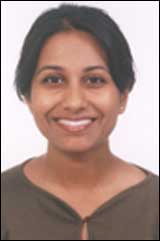 About Me
About Me
My father and mother immigrated with me to America from Sri Lanka in 1976, new parents in a new country. Two small suitcases held their lives, raw from culture shock, to be transplanted in snowy soil. Being the daughter of a physician, I was instilled with a deep respect for the healing professions at a young age. My parents were both very strong examples for me. They were determined, extremely hard-working, and they concentrated on us kids as if nothing else in the world mattered. Their influence shaped me in my formative years and embedded a strong need within me to nurture. I wanted to be a person people went to when they were in pain so I could give them one less thing to cry about; one less thing to worry about; one less thing to have to suffer through, because, despite its beauty, life already held enough pain.
My initial interest in dentistry began when I was studying microbiology. My respect for the damage microbes could render caused me to turn my attention towards the preventive aspect of dentistry. It was at an SHPA guest lecture that I met my first dentist mentor. After day one of volunteering at his office, I regretted that I hadn’t considered dentistry sooner. I volunteered at the UCLA dental clinic, and was blown away by their dental school. I thought the only way I could attend UCLA dental, or any dental school in California for that matter, was only in my dreams.
When viewed in its entirety, the application process looked like one great big tangled ball of yarn, but the Health Professions Office calmly unraveled it all for me. They gave me their big blue application timeline, wound me up, and pointed me in the right direction. They repeatedly went over my personal statement with a fine-toothed comb until it was perfect. I can’t even begin to describe what a huge relief it was during that terribly stressful time. My acceptance to UCLA dental school is in no small part due to the support of Ms. Barb Hoke and the Health Professions Committee. I came to them with this wisp of a dream, and they helped me buckle down to make it my reality. Choosing to attend Cal State Fullerton will always be among the best life decisions I have ever made.
- Sujee Dissanayake
August, 2004
Thu Trinh
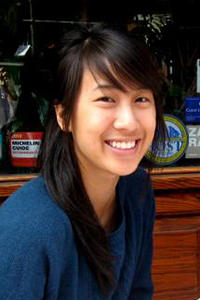 About Me
About Me
I received my Bachelor’s Degree in Biology in May of 2009. I enjoy swimming, bicycling, reading, water-coloring, and making boba. My path to the health professions started early in my college career. After I shadowed several dentists in my county, I realized I wanted the intellectual challenge, the job security, and also to keep my manual dexterity in check. Ultimately, I wanted to pursue dentistry because of its expansive possibilities. After dental school, I could work in family clinics, open a private practice, go into academia, or pursue further education in a specialty field. In any case, I would be my own boss. This is the dream.
The Application
In 2006, I started preparing for the dental application process, and it was 2008 that I finished the process. This was my “game-plan”:
- Your GPA is very important. Take the pre-req’s first — start with courses that are going to be on the DAT. Keep refreshing the material after you’ve passed the class.
- Take the DAT (aim for a 30) as soon are you are ready (be ready early!!). The DAT is a standardized test that will show the admissions committee that CSUF produces great applicants with great knowledge of the sciences (thanks to our great science faculty). It would be nice if your DAT percentile is similar to your GPA. If it’s higher, it’s even better. Use review books (classes can be expensive).
- Extracurriculars. I volunteered at a free medical clinic in Los Angeles, and shadowed many dentists. I also did things that interested me— swim instructor, arts and crafts assistant, and learning how to play the piano. The application process is tough—don’t forget who you are or leave everything in the dust. It’s just going to make it a little harder when you are being grilled at the interview table.
- Research. I worked in a genetics lab and became familiar with the concepts and techniques behind research. Time-management is an important issue. NEVER let your extracurriculars get in the way of my GPA and studying for the DAT. Remember your priorities… that’s a lesson for this application game. Just do as much as you can handle.
The Interview—the last 50%
The interview process is admissions committee’s way of determining if your personality fits the class that they are trying to make. I hope you wrote some interesting things in your personal statement to make the adcom curious to find out more about you. Every school interviews in a different way. I’ve had interviewers ask me questions ranging from “why dentistry”, “tell me about yourself”, to “what is your definition of spirituality” or “how do you make pho”. Don’t be nervous; just be honest.
Choices
Early acceptance comes out December 1st. If you want to have options, APPLY EARLY. All dental schools teach you the basics, but if cost, location, and curricula are important to you, APPLY EARLY so you can interview at different schools have a variety choices.
Teamwork
My final advice is to play like a team member. There are other pre-dents at CSUF. You can study together or support each other through the process. I am very proud of our CSUF pre-dental society, and know that only the most determined, genuine applicants apply. You’re all going to be dentists anyway, so remember the theory of John Maynard Smith and don’t forget to lend a hand.
Emmanuel Gluckman
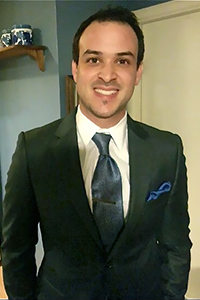 Before I start, I’d like to thank Dr. Walker, Dr. Chen, Dr. Goode, and the Health Professions Office for being nothing but helpful, accommodating, and encouraging towards me throughout my entire journey to dental school here at CSUF – I would not be nearly as successful as I have been without your help and guidance.
Before I start, I’d like to thank Dr. Walker, Dr. Chen, Dr. Goode, and the Health Professions Office for being nothing but helpful, accommodating, and encouraging towards me throughout my entire journey to dental school here at CSUF – I would not be nearly as successful as I have been without your help and guidance.
ABOUT ME AND MY EXPERIENCE AT CSUF
My name is Manny Gluckman and I recently graduated from CSUF Summa Cum Laude in the fall of 2013. I was extremely fortunate to receive interviews from such prestigious universities like UCLA, UCSF, USC, The University of Pennsylvania, and The University of Michigan (among many others), and I’m thrilled to be attending the UCLA School of Dentistry next fall as a part of the class of 2018.
During my time here, I was the Dental Chair of the Student Health Professions Association for three years, a member of Dr. Chen’s Microbiology Research Lab for a little over a year, and a Supplemental Instruction leader for the Biology Department for three years as well. Outside of CSUF, I regularly volunteered at an elementary school and helped coach a youth basketball team throughout my time in college. In addition, I spent close to 200 hours shadowing a variety of dentists and dental specialists to get a real-life feel for what the profession is like. Collectively, these experiences honed my critical thinking skills, taught me how to work as a part of a team, and most importantly they taught me how to interact with all different types of people – all traits essential for success in any of the health professions.
APPLICATION PROCESS/MY ADVICE TO APPLICANTS
The application process is a long and tedious one, but there are definitely things you can do to help maximize your chances. First and foremost – APPLY EARLY. I can’t stress how important this is – do not underestimate it. Next, buy the ADEA book and find out which schools to apply to based on your stats and which schools accept a good percentage of CA residents. Lastly, apply broadly – at least 10 schools, and in my opinion somewhere north of 15, NO MATTER WHAT YOUR NUMBERS ARE. You want to maximize your chances, and the whole process really can be a bit random and you never know why a school will like or not like you as an applicant.
In terms of being a successful applicant, I have three main pieces of advice:
- Don’t sacrifice your grades/test scores at the expense of extra curricular activities You need both, but your GPA/DAT are what get you in the door (Your people skills and extra curricular experience are what will make your interview successful)
- Be True to Yourself: In other words, don’t do something because you think it will improve your application, do it because you genuinely enjoy it. Being fake on your application will be evident in your interviews and it will absolutely hurt your chances.
- People skills are equally as important (if not more so) than your numbers
We have to realize that for the most part, our patients won’t know a thing about science. Of course it’s vital that we are competent in all of the courses we take both in undergrad and professional school, but in order to build strong relationships with our future patients we must find a way to make difficult scientific material relatable to the average person. In your interviews, demonstrate that you are personable and that can relate to any type of person in an everyday setting – be able to talk about current events, movies, sports, etc. This may seem strange now, but when you’re in the real world these skills will go hand in hand with what you learn in the classroom in terms of fostering good relationships with your patients and making them feel comfortable with you.
In closing, I know that the road to professional school is an arduous one that seems to drag on and on and on. At times it may seem easy to give up, but always remember your passion for what you are pursuing to keep you focused. All of the studying and sacrifices you make will be more than worth it when you receive those admissions calls.
Best of luck!
Skyler Schübel
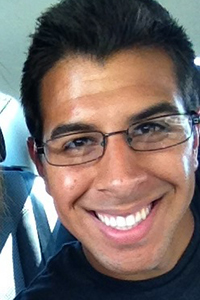 Dear Readers,
Dear Readers,
First and foremost I would like to take this opportunity to thank my parents who have been there for me from thebeginning. There was more than one occasion where I wanted to give up on going to dental school, and without their support and guidance I probably wouldn’t be starting dental school this summer. I love you mom and dad.
On that note I would also like to thank anyone and everyone who has helped me on this journey in some way.
Even though all my teachers and professors over the years have positively impacted me in a number of ways I would like to take some time to make notable mention of several that have always stood out to me as important in my growth and success. I would like to start with Mrs. Finn from 5th grade who always believed in my ability to succeed regardless of what I may have thought. Mrs. Stoltz from my 6th and 7th grade designed-based learning class who taught me a great deal about hands on learning and how it could be applied in my life. I will always remember her saying “if you see you forget, if you hear you remember, if you do you understand.” To Mrs. Odwyer from my 8th grade history class who taught me that first impressions are not always correct. To all of my high school teachers such as Mrs. Lordi, Mr. Rodriguez, and my high school student counselor Mr. Ozaki. To my professors in college both at Cal Poly Pomona when I did attend there for the first couple of years of college, and of course to all of my professors here at Cal State Fullerton. Most notably I would like to thank Dr. Philip Janowicz, Dr. Merri Lynn Casem, Dr. Christina Goode, and the Health Professions Office for writing reference letters on my behalf, in addition to their support, guidance, and advice throughout my journey while attending CSUF to get to dental school.
I would also like to thank Dr. James Chae from Diamond Bar Dental Group, Dr. Byron Diehl from Diehl’s Orthodontics, Dr. Katherine Ahn from Impression Dental Care, and Dr. Frank Finazzo from Winning Smiles for their support and friendship, and for allowing me to volunteer over the years and do internships with many of them.
Unfortunately I cannot include every person’s name on here who has had a positive impact in my life, but that does not make them any less important. For those of you who I have not mentioned I want you to know that I appreciate you, and could never thank you enough for all you have done for me.
A Little About Me
I grew up in the City of Diamond Bar here in sunny California. I went to elementary, middle, and high school in the area, and always struggled in school in some way due to my diagnosed ADHD as a child. I didn’t let that deter me, however, because I continued pushing forward with the help of my parents, family, friends, mentors, and other people I had who supported me no matter the obstacles I faced along my journey through life. As a result of my perseverance and support I successfully graduated high school with honors, earned my Eagle Scout Award, got accepted into and graduated college here at CSUF, became a published co-author in an Organic Chemistry journal, and now in the next chapter of my life I have been accepted to and will be attending Western University of Health Sciences College of Dental Medicine.
I would implore any of you who might be reading this to always push forward and get back up if you get knocked down, because no matter how many times you may fall or fail your successes aren’t necessarily measured by the goals you reach in life, but by the obstacles you face and overcome, and the impact you make in other people’s lives along the way.
A Little Background on my Dentistry Journey
My fascination with teeth and dentistry began early on at age eight when I experienced how my first braces could change my smile, and also instill greater confidence in me. It wasn’t until late in 2012, however, that I reached a point where my passion grew into something more focused than the desire to produce an aesthetic smile. All of my life experiences up to this point have led me to view the body as an integrated whole, and that utilizing some holistic perspectives, such as the use of interprofessional collaboration to improve the success and quality of care, that can benefit patient’s in all aspects of their health and well-being. This view increased my passion for pursuing a career in dentistry due to its ability to profoundly impact and better one’s health. As a result I now would like nothing more than to emerge as a successful and caring healthcare professional who not only embraces life-long learning as essential in patient care, but also one who seeks specialization and further education to hone his skills. With these new skills I will apply what I have learned to effectively treat a multitude of dental-related ailments by offering comprehensive dental care, while also making it a point to discuss and educate my patients on the importance of oral health and teeth preservation in their daily lives.
Application process and advice for applicants
The application process is a long and tedious one, but there are definitely things you can do to help maximize your chances of success. First and foremost – APPLY EARLY, or at least as early as possible. This entails first taking full advantage of what the health professions office offers in terms of their intent to apply application. This is a very good place to start since it gets you started early on with what to include in your actual dental school application, as well as helping guide you for ultimate success. Applying for and getting approved for the intent to apply application offered by the Health Professions office was one of the first big steps for me in my entire application process. I feel without the office’s support and guidance I wouldn’t be where I am today in terms of my dental school acceptance. So thank you Dr. Goode and everyone in the health professions office for all you do :).
In addition, I applied fairly early for my AADSAS application, which I completely finished and turned in towards the end of July, but I would recommend applying in June if at all possible since that would give you a better chance of getting noticed, and getting interviews. Next, find out which schools to apply to based on your stats and which schools accept a good percentage of CA residents. Apply broadly – at least 12-15 or more schools even if they may “seem” like schools that have higher GPA and DAT scores than yours. You want to maximize your chances, and the whole process really can be a bit random and you never know why a school will like or not like you as an applicant. This was my first application cycle and I applied to 14 schools, and thus far as of February I had 4 interview invites (WesternU, USC, Howard University and UCSF, although I never interviewed at UCSF because I already accepted WesternU), 2 acceptances (WesternU and Howard), and 1 waitlist (USC). My GPA was about a 3.2 with a DAT score of 19, but I honestly feel that my personal statement, letters of recommendation, extra-curricular activities, volunteering, and how genuine I was during my interviews are truly the things that helped set me apart for me to receive two acceptance letters even though this was my first round applying.
In terms of being a successful applicant here are some of the things I had to consider during the application process:
- GPA/DAT scores are certainly important, but don’t skimp on extra-curricular activities and life experience: I may not have had the highest GPA while attending CSUF, or even the highest DAT scores, but that doesn’t mean that you shouldn’t try to get the best grades possible for yourself. I would try and achieve the best scores you can since they will open more doors and opportunities for you. However, also try and balance any volunteering, and other life experiences and extra-curricula’s that will help you be a well-rounded person. I feel your people skills, unique life and extra-curricular experiences, and your genuine nature in both your essays and interviews are what will give you that competitive edge for you to ultimately get those acceptance letters.
- Be True to Yourself, Be Genuine: In other words, don’t do something because you think it will improve your application, do it because you genuinely enjoy it. Being fake on your application will be evident in your interviews and it will absolutely hurt your chances. Also, I feel it is important to apply when you truly feel ready. Even though I had an interest in Dentistry for some time from elementary school until college it took me some time over the years to really develop a passion for it. As a result it took me longer to apply them some, but when I did feel ready I knew without a doubt that this is what I wanted to do, and I was going to get there no matter what, or how long it would take. Once I had the true passion and drive to apply and take the necessary steps then everything else seemed to fall right into place :).
- People skills are equally as important (if not more so) than your numbers could ever be alone: In your interviews, demonstrate that you are genuine and personable, and that you can relate to any type of person in an everyday setting by being able to talk about how their day is going, discuss any recent or old movies they may have seen, and ask them about their hobbies to name a few. I feel this is so vital it can’t be stressed enough. These essential skills will go hand in hand with what you learn in the classroom in terms of fostering good relationships with your patients and making them feel comfortable with you, so that way you can make a lasting impact in their lives.
- Embrace Life-Long Learning and Growth: This may seem silly to some, but I can’t emphasize enough how important it will be for you to embrace the concept of life-long learning. It will not only help you for your interviews, but also in life since we should never stop trying to learn and improve ourselves in all aspects. This will also aid you in improving both yourself as a person, and as a health professional who wants the best for his or her patients. One of the things that I would like to mention and that I believe in is that behind any of my successes, or anyone else’s growth and success for that matter… is a great support system of people from past and present that have positively impacted their life no matter how seemingly fleeting the interaction, or deep the bond.
In closing, I know that the road to professional school is an arduous one that seems to drag on forever, and may even seem like an impossible goal to achieve at times, but if anything, always remember your passion and the true reason why you are pursuing a career in the health professions. All of the studying and sacrifices you make will be more than worth it when you receive those admission letters. I wish you all the best of luck, stay focused, and push forward no matter what life may throw at you.
Sincerely,
Skyler Schübel
